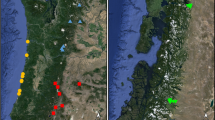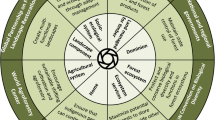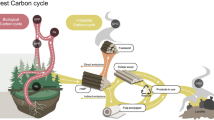Abstract
Global climate change may have a serious impact on genetic resources in tropical forest trees. Genetic diversity plays a critical role in the survival of populations in rapidly changing environments. Furthermore, most tropical plant species are known to have unique ecological niches, and therefore changes in climate may directly affect the distribution of biomes, ecosystems, and constituent species. Climate change may also indirectly affect plant genetic resources through effects on phenology, breeding systems, and plant-pollinator and plant seed disperser interactions, and may reduce genetic diversity and reproductive output. As a consequence, population densities may be reduced leading to reduction in genetic diversity through genetic drift and inbreeding. Tropical forest plants may respond to climate change through phenotypic plasticity, adaptive evolution, migration to suitable site, or extinction. However, the potential to respond is limited by a rapid pace of change and the non-availability of alternate habitats due to past and present trends of deforestation. Thus climate change may result in extinction of many populations and species. Our ability to estimate the precise response of tropical forest ecosystems to climate change is limited by lack of long-term data on parameters that might be affected by climate change. Collection of correlative data from long-term monitoring of climate as well as population and community responses at selected sites offer the most cost-effective way to understand the effects of climate change on tropical tree populations. However, mitigation strategies need to be implemented immediately. Because many effects of climate change may be similar to the effects of habitat alteration and fragmentation, protected areas and buffer zones should be enlarged, with an emphasis on connectivity among conserved landscapes. Taxa that are likely to become extinct should be identified and protected through ex situ conservation programs.
Similar content being viewed by others
References
Appanah, S.: 1993, ‘Mass Flowering of Dipterocarp Forests in the Aseasonal Tropics’, J. Biosci. 18, 457-474.
Ashton, P. S., Givinish, T. J., and Appanah, S.: 1988, ‘Staggered Flowering in the Dipterocarpaceae: New Insights into Floral Induction and the Evolution of Mast Fruiting in the Aseasonal Tropics’, Amer. Nat. 32, 44-66.
Appanah, S.: 1993, ‘Mass Flowering of Dipterocarp Forests in the Aseasonal Tropics’, J. Biosci. 18, 457-474.
Ashton, P. S.: 1988, ‘Dipterocarp Biology as a Window to the Understanding of Tropical Forest Structure’, Ann. Rev. Ecol. Syst. 19, 347-370.
Augspurger C. K.: 1982, ‘A Cue for Synchronous Flowering’, in Leigh, E. G., Rand, A. S., and Windsor, D. M. (eds.), The Ecology of a Tropical Forest: Seasonal Rhythms and Long Term Changes, Smithsonion Institution, Washington, D.C., pp. 133-150.
Bawa, K. S.: 1993, ‘Effects of Deforestation and Forest Fragmentation on Genetic Diversity in Tropical Tree Populations’, in Drysdale, R. M., John, S. E. T., and Yapa, A. C. (eds.), Genetic Conservation and Production of Tropical Forest Seed, ASEAN Canada Forest Tree Seed Centre, MuakLek, Saraburi 18180, Thailand, pp. 10-16.
Bawa, K. S.: 1974, ‘Breeding Systems of Tree Species of a Lowland Tropical Community’, Evolution 28, 85-92.
Bawa, K. S.: 1983, ‘Patterns of Flowering in Tropical Plants’, in Jones, C. E. and Little, R. J. (eds.), Handbook of Experimental Pollination Biology, Van Nostrand and Reinhold Co., New York, pp. 395-410.
Bawa, K. S., Perry, D. R., and Beach, J. H.: 1985, ‘Reproductive Biology of Tropical Lowland Rain Forest Trees. I. Sexual Systems and Self-Incompatibility Mechanisms’, Amer. J. Botany 72, 33l-345.
Bazzaz, F. A., Ackerly, D. D., Woodward, F. I., and Rochefort, L.: 1992, ‘CO2 Enrichment and Dependance of Reproduction on Density in an Annual Plant and a Simulation of its Population Dynamics’, J. Ecol. 80, 643-652.
Bazzaz, F. A., Jasienski, M., Thomas, S. C., and Wayne, P.: 1995, ‘Microevolutionary Responses in Experimental Populations of Plants to CO2 Enriched Environments: Parallel Results from Two Model Systems’, Proc. Nat. Acad. Sci. 92, 8161-8165.
Bazzaz, F. A., Bassow, S. L., Berntson, G. M., and Thomas, S. C.: 1996, ‘Elevated CO2 and Terrestrial Vegetation: Implications for and Beyond the Global Carbon Budget’, in Walker, B. and Steffen, W. (eds.), Global Change and Terrestrial Ecosystems, Cambridge University Press, Cambridge, pp. 43-76.
Bhat, D. M.: 1992, ‘Phenology of Tree Species of Tropical Moist Forest of Uttara Kannada District, Karnataka, India’, J. Biosci. 17, 325-352.
Borchert, R.: 1994a, ‘Water Storage in Soil or Tree Stems Determines Phenology and Distribution of Tropical Dry Forest Trees’, Ecology 75, 1437-1449.
Borchert, R.: 1994b, ‘Water Status and Development of Tropical Trees During Seasonal Drought’, Trees 8, 115-125.
Condit, R.: 1995, ‘Research in Large, Long Term Tropical Forest’, Trends Ecol. Evolut. 10, 18-22.
Chapin III, F. S., Rincon, E., and Huante, P.: 1993, ‘Environmental Responses of Plants and Ecosystems as Predictors of the Impact of Global Change’, J. Biosci. 18, 515-524.
Enoch, H. Z., Rylski, I., and Spigelman, M.: 1976, ‘CO2 Enrichment of Strawberry and Cucumber Plants Grown in Unheated Greenhouse in Israel’, Scient. Hortic. 5, 33-41.
Feinsinger, P.: 1983, ‘Coevolution and Pollination’, in Futuyama, D. J. and Slatkin, M. (eds.), Coevolution, Sinauer Associates, Sunderland, MA, pp. 282-310.
Flenley, J. R.: 1979, The Equatorial Rainforest: A Geographical History, Butterworth, London.
Foster, R. B.: 1982, ‘Famine on Barro Colorado Island’, in Leigh Jr., E. G., Rand, A. S., and Windsor, D. M. ( eds.), The Ecology of a Tropical Forest: Seasonal Rhythms and LongTerm Changes, Smithsonian Institution Press, Washington, D.C., pp. 201-212.
Frankie, G. W., Baker, H. G., and Opler, P. A.: 1974, ‘Comparative Phenological Studies of Trees in Tropical Wet and Dry Forests in the Lowlands of Costa Rica’, J. Ecol. 62, 881-919.
Frankie, G. W., Newstorm, L., Vinson, S. B., and Barthell, J. F.: 1993, ‘Nesting Habitat Preferences of Selected CentrisBee Species in Costa Rican Dry Forest’, Biotropica 25, 322-333.
Geber, M. A. and Dawson, T. E.: 1993, ‘Evolutionary Responses of Plants to Global Change’, in Kareiva, P. M., Kingsolver, J. G., and Huey, R. B. (eds.), Biotic Interactions and Global Change, Sinauer Associates, Sunderland, MA, pp. 179-197.
Guzman de, E. D., Umali, R. M., and Sotalbo, E. D.: 1986, Guide to Philippine Flora and Fauna, Vol. 3, Dipterocarps, Non-Dipterocarps, Ministry of Natural Resources and University of Philippines, Philippines.
Hall, P., Chase, M. R., and Bawa, K. S.: 1993, ‘Low Genetic Variation but High Population Differentiation in a Common Tropical Forest Trees Species’, Conservat. Biol. 8, 471-482.
Hall, P., Walker, S., and Bawa, K. S.: 1996, ‘Effects of Forest Fragmentation on Genetic Diversity and Mating Systems in a Tropical Tree, Pithecellobium elegans’, Conservat. Biol. 10, 757-768.
Hamrick, J. L.: 1993, ‘Genetic Diversity and Conservation in Tropical Forests’, in Drysdale, R. M., John, S. E. T., and Yapa, A. C. (eds.), Genetic Conservation and Production of Tropical Forest Seed, ASEAN Canada Forest Tree Seed Centre, MuakLek, Saraburi 18180, Thailand, pp. 1-9.
Hartshorn, G. S.: 1983, ‘Plants. Introduction’, in Janzen, D. H. (ed.), Costa Rican Natural History, University of Chicago Press, Chicago, pp. 118-157.
Hartshorn, G. S.: 1990, ‘An Overview of Neotropical Forest Dynamics’, in Gentry, A. H. (ed.), Four Neotropical Rainforests, Yale University Press, New Haven, pp. 585-599.
Hartshorn, G. S.: 1992, ‘Possible Effects of Global Warming on the Biological Diversity in Tropical Forests’, in Peters, R. L. and Lovejoy, T. E. (eds.), Global Warming and Biological Diversity, Yale University Press, New Haven, pp. 137-146.
Hattemer, H. H. and Gregorius, H. R.: 1990, ‘Is Gene Conservation Under Global Climate Change Meaningful?’, in Jackson, M., FordLloyd, B. V., and Parry, M. L. (eds.), Climate Change and Plant Genetic Resources, Bethaven Press, New York, pp. 158-166.
Hesketh, J. D. and Helmers, H.: 1973, ‘Floral Initiation in Four Plant Species Growing in CO2 Enriched Air’, Environ. Control Biol. 11, 51-53.
Hovland, A. S. and Dybing, C. D.: 1973, ‘Cyclic Flowering Patterns in Flax as Influenced by Environment and Plant Growth Regulators’, Crop Sci. 13, 380-384.
Howe, H. F.: 1993, ‘Specialized and Generalized Dispersal Systems: Where Does “The Paradigm” Stand?’, Vegetatio 107/108, 3-13.
Hulme, M. and Viner, D.: 1995, ‘A Climatic Change Scenario for Assessing the Impact of Climate Change on Tropical Rain Forests’, Report Prepared for the Climatic Research Unit of WWF (U.S.),Washington, D.C.
Imazu, T., Yabuk, K., and Oda, Y.: 1967, ‘Studies on the Influence of Carbon Dioxide Concentration on the Growth, Flowering and Fruit Setting of Egg Plant (Solanum melongenaL.)’, J. Japan. Soc. Hortic. Sci. 36, 222-227.
Inoue, K.: 1993, ‘Evolution of Mutualism in Plant-Pollinator Interactions on Islands’, J. Biosci. 18, 525-536.
Janzen, D. H.: 1967, ‘Synchronization of Sexual Reproduction of Trees within the Dry Season in Central America’, Evolution 21, 620-637.
Kang, H., Jaschek, G., and Bawa, K. S.: 1992, ‘Variation in Seed and Seedling Traits in Pitchecellobium pedicellare, a Tropical Rain Forest Tree’, Oecologia 91, 239-244. [
Larigauderie, A., Hilbert, D. W., and Oechel, W. C.: 1988, ‘Effect of CO2 Enrichment and Nitrogen Availability on Resource Acquisition and Resource Allocation in a Grass, Bromus mollis’, Oecologia 77, 544-549.
Ledig, F. T. and Kitzmiller, J. H.: 1992, ‘Genetic Strategies for Reforestation in the Face of Global Climate Changes’, Forest Ecol. Manage. 50, 153-169.
Leighton, M. and Wirawan, N.: 1986, ‘Catastrophic Drought and Fire in Borneo Tropical Rainforest Associated with the 1982-1983 El Niño Southern Oscillation Event’, in Prance, G. T. (ed.), Tropical Rain Forests and the World Atmosphere, Westview Press, Boulder, CO, pp. 75-102.
MacArthur, R. H.: 1972, Geographical Ecology, Harper and Row, New York.
Marc, J. and Gifford, R.M.: 1984, ‘Floral Initiation in Wheat, Sunflower and Sorghum under Carbon Dioxide Enrichment’, Can. J. Botany 62, 9-14.
Murawski, D. A. and Hamrick, J. L.: 1991, ‘The Effect of the Density of Flowering Individuals on the Mating Systems of Nine Tropical Tree Species’, Heredity 67, 167-174.
Palloix, A., Herve, Y., Knox, R. B., and Dumas, C.: 1985, ‘Effect of Carbon Dioxide and Relative Humidity on Self-Incompatibility in Cauliflower, Brassica oleracea’, Theor. Appl. Gen. 70, 628- 633.
Reekie, E. G. and Bazzaz, F. A.: 1989, ‘Competition and Patterns of Resource Use Among Seedlings of Five Tropical Trees Grown at Ambient and Elevated CO2’, Oecologia 79, 212-222.
Reekie, E. G. and Bazzaz, F. A.: 1991, ‘Phenology and Growth in Four Annual Species Grown in Ambient and Elevated CO2’, Can. J. Botany 69, 2475-2481.
Scheiner, S. M.: 1993, ‘Genetics and Evolution of Phenotypic Plasticity’, Ann. Rev. Ecol. Syst. 24, 35-68.
Singh, J. S. and Singh, V. K.: 1992, ‘Phenology of a Seasonally Dry Tropical Forest’, Curr. Sci. 63, 684-689.
Sivaraj, N. and Krishnamurthy, K. V.: 1989, ‘Flowering Phenology in the Vegetation of Shervaroys, South India’, Vegetatio 79, 85-88.
Sukwong, S., Dhamanitayakul, P., and Pongumphai, S.: 1975, ‘Phenology and Seasonal Growth of Dry Dipterocarp Forest Tree Species’, Kasetsart J. 9, 105-114.
Whitmore, T. C.: 1990, An Introduction to Tropical Rain Forests, Clarendon Press, Oxford, England.
Wulff,R. D. and Alexander, H. M.: 1985, ‘IntraSpecificVariation in the Response to CO2 Enrichment in Seeds and Seedlings of Plantago lanceolataL.’, Oecologia 66, 458-460.
Author information
Authors and Affiliations
Rights and permissions
About this article
Cite this article
Bawa, K.S., Dayanandan, S. Global Climate Change and Tropical Forest Genetic Resources. Climatic Change 39, 473–485 (1998). https://doi.org/10.1023/A:1005360223639
Issue Date:
DOI: https://doi.org/10.1023/A:1005360223639




